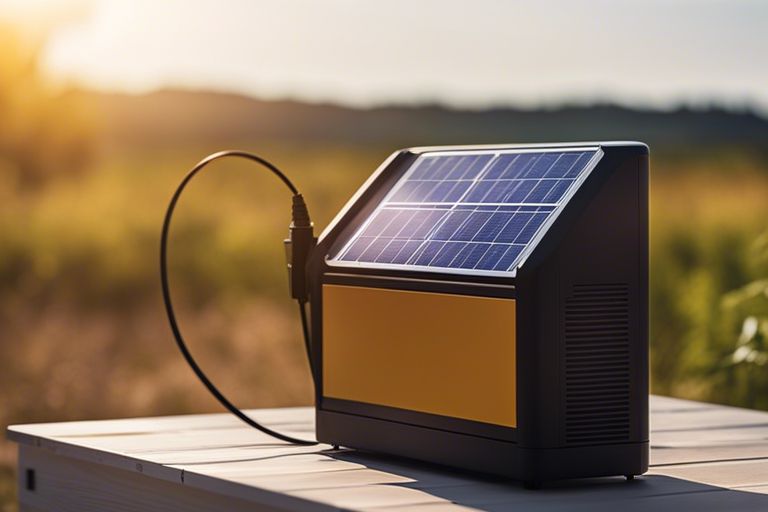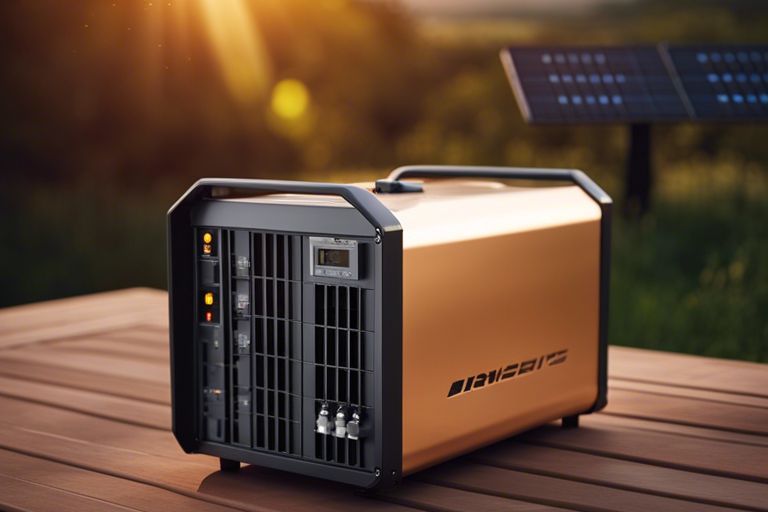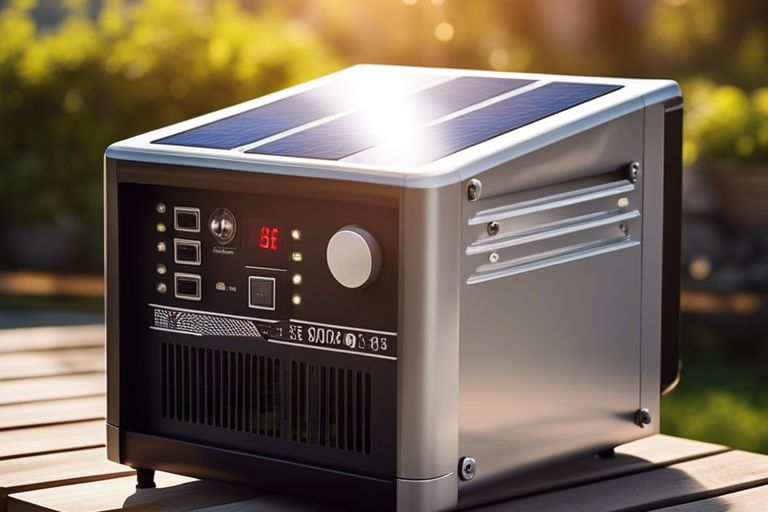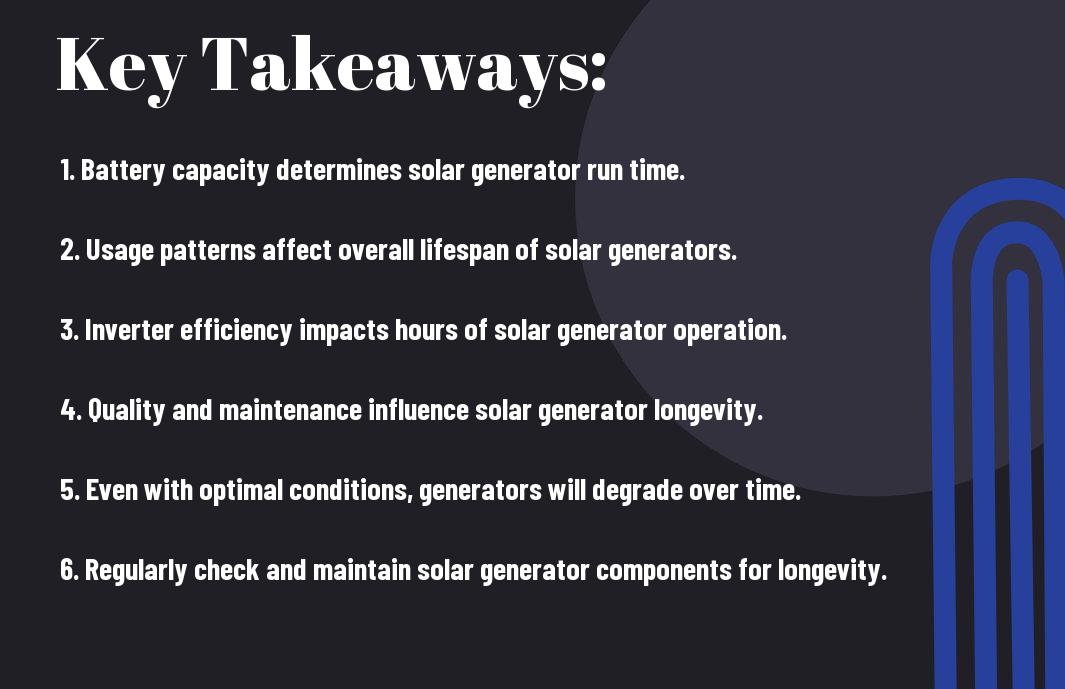You may be wondering about the longevity of a solar generator and how many hours it can power your devices. Understanding the factors that impact the battery life of your solar generator can help you make informed decisions about your power needs. Let’s explore into the key factors that determine how many hours a solar generator can last and how to get the most out of your portable power source.
Key Takeaways:
- Solar Generator Lifespan: Solar generators can last for approximately 20-30 years with proper maintenance.
- Battery Life: The battery within a solar generator typically has a lifespan of 5-15 years, depending on usage and maintenance.
- Usage Impact: The number of hours a solar generator will last depends on the amount of power it is supplying and the size of its battery capacity.
- Maintenance: Regular maintenance, such as cleaning solar panels and monitoring battery health, can extend the lifespan of a solar generator.
- Replacement Costs: If components such as batteries need replacing, it’s important to factor in the cost of replacement when evaluating the total lifespan of a solar generator.
Factors Affecting Solar Generator Lifespan
The lifespan of a solar generator can vary based on several factors. Understanding these factors can help you make informed decisions to maximize the longevity of your solar generator. Here are some key factors that can affect the lifespan of your solar generator:
Battery Type and Quality
One crucial factor that influences the lifespan of a solar generator is the type and quality of the battery used. Lithium-ion batteries, for example, tend to have a longer lifespan compared to lead-acid batteries. Investing in high-quality batteries can significantly prolong the life of your solar generator.
Therefore, it’s vital to consider the battery type and quality when choosing a solar generator. Opting for a reputable brand with reliable batteries can ensure that your solar generator lasts for many years.
Thou should also regularly maintain and calibrate the batteries to ensure they are functioning efficiently and to extend their lifespan.
Solar Panel Efficiency
Efficiency is another significant factor that can impact the lifespan of your solar generator. Higher efficiency solar panels can convert more sunlight into electricity, which reduces the strain on the system and prolongs its lifespan.
This is why it’s vital to choose solar panels with high efficiency ratings for your solar generator. Investing in quality panels can increase the overall efficiency of your system and extend its lifespan.
This also means that regularly cleaning and maintaining your solar panels can help improve their efficiency and maximize the lifespan of your solar generator.
Load Size and Type
Affecting the load size and type is vital for the longevity of your solar generator. Higher loads or sudden spikes in energy consumption can put a strain on the system, potentially reducing its lifespan.
Understanding your energy needs and ensuring that your solar generator is properly sized for your load requirements can help prevent overloading and prolong its lifespan. Additionally, using energy-efficient appliances and spreading out heavy loads can also help optimize the performance and lifespan of your solar generator.
Calculating Solar Generator Runtime
Even if you have the best solar generator on the market, understanding how long it will last before needing a recharge is crucial. To calculate the runtime of your solar generator, there are a few key factors to consider, such as the energy units and your energy needs.
Wh vs. Ah: Understanding Energy Units
Understanding the difference between Watt-hours (Wh) and Ampere-hours (Ah) is imperative when calculating your solar generator’s runtime. Watt-hours refer to the total amount of energy a battery can store and deliver over time, while Ampere-hours measures the charge capacity of a battery. Knowing the energy units will help you accurately estimate how long your solar generator can power your devices.
Determining Your Energy Needs
Understanding your energy needs is the first step in calculating the runtime of your solar generator. Make a list of the devices you plan to power with the generator and their power requirements in Watts. Summing up the power requirements will give you an estimate of the total power consumption per hour. This information is vital for determining the size and capacity of the solar generator you need.
It is advisable to overestimate your energy needs when calculating the runtime of your solar generator to ensure you have enough power for unexpected situations or emergencies.
Using Online Calculators and Tools
Energy calculators and tools available online can help simplify the process of estimating the runtime of your solar generator. These tools allow you to input the power requirements of your devices, the capacity of your solar generator, and other relevant information to generate an estimate of how many hours your solar generator can run before needing a recharge.
Energy calculators can also factor in variables such as sunlight intensity, battery efficiency, and other environmental conditions to provide a more accurate runtime estimate for your solar generator.
It is important to periodically reassess your energy needs and update the calculations for your solar generator’s runtime to ensure you have sufficient power for your devices when you need it most. By following these steps and utilizing online tools, you can confidently determine how many hours your solar generator will last and plan your power usage accordingly.
Typical Runtime Expectations
Small Solar Generators (100-500Wh)
For small solar generators with a capacity of 100-500Wh, the runtime can vary depending on the energy efficiency of your devices. Typically, these generators can power small electronics like smartphones, tablets, or LED lights for several hours. However, if you’re running larger devices like laptops or mini-fridges, the runtime will decrease accordingly.
Medium Solar Generators (500-2000Wh)
To make the most of medium solar generators ranging from 500-2000Wh, it’s necessary to prioritize your power usage. These generators can handle larger devices for an extended period, such as running a refrigerator overnight or charging multiple devices simultaneously. With proper conservation and smart energy consumption, you can expect a medium solar generator to last you through the night or even up to a full day of moderate use.
Generators in this range are versatile enough to support camping trips, outdoor events, or as a reliable backup during power outages. They strike a good balance between portability and capacity, offering you enough power to keep necessary devices running without being too bulky to transport.
Large Solar Generators (2000-5000Wh)
Large solar generators with capacities of 2000-5000Wh are built for more demanding power needs. These generators can sustain energy-hungry appliances like full-size refrigerators, power tools, or medical equipment for an extended period. With such a high watt-hour capacity, you can expect a large solar generator to last through the night and well into the next day without needing a recharge.
It’s worth noting that large solar generators are heavier and less portable compared to their smaller counterparts. However, the trade-off in size is outweighed by the extended runtime and ability to power more substantial appliances, making them ideal for emergency situations or off-grid living where consistent power is necessary.
Extending Solar Generator Lifespan
Proper Maintenance and Storage
Maintenance plays a crucial role in extending the lifespan of your solar generator. Regularly clean the solar panels to ensure optimal performance. Store your solar generator in a cool, dry place when not in use to prevent any damage from environmental factors.
Upgrading or Replacing Batteries
One way to prolong the lifespan of your solar generator is by upgrading or replacing the batteries when needed. Over time, batteries can degrade and affect the overall performance of the system. By replacing them with high-quality batteries, you can enhance the efficiency and longevity of your solar generator.
Generator The solar panels generate energy, which is stored in the batteries. Therefore, ensuring that you have reliable batteries is imperative for the proper functioning and durability of your solar generator.
Optimizing System Configuration
Generator To further extend the lifespan of your solar generator, it’s important to optimize the system configuration. This includes ensuring that the panels are positioned to receive maximum sunlight and that the wiring and connections are secure and efficient. By fine-tuning your system configuration, you can maximize the performance and longevity of your solar generator.
To get the most out of your solar generator and ensure a longer lifespan, it’s imperative to follow these maintenance tips, consider upgrading or replacing batteries when necessary, and optimize the system configuration for optimal performance.
Real-World Examples and Scenarios
Camping and Outdoor Adventures
Not sure how many hours a solar generator will last during your camping trips or outdoor adventures? Let’s explore some scenarios to give you a better idea.
Home Backup Power Systems
Scenarios where you might need a solar generator for your home backup power system can vary from short power outages to longer periods without electricity. Understanding how many hours a solar generator can last will help you plan accordingly.
When considering a solar generator for your home, think about the imperative appliances you would need to power during an outage, such as lights, refrigerator, or medical devices. Knowing the capacity and endurance of your solar generator is crucial for backup power needs.
Remote Workstations and Offices
Outdoor workstations or remote offices often rely on solar generators to keep electronic devices and equipment running smoothly. In these scenarios, the longevity of your solar generator is imperative for maintaining productivity.
To ensure you have enough power to last through your workday, you should calculate the energy requirements of your devices and choose a solar generator with the capacity to meet your needs.
Common Misconceptions and Myths
Debunking “24/7” Runtime Claims
Your solar generator is a powerful tool for providing electricity off the grid, but it doesn’t run 24/7. Many manufacturers may market their solar generators as capable of running continuously, but this claim is often exaggerated. The reality is that the runtime of a solar generator is determined by its capacity and the amount of power you are drawing from it.
The Impact of Depth of Discharge (DOD)
Debunking the myth that the depth of discharge (DOD) doesn’t affect the lifespan of your solar generator is crucial. DOD refers to how much of the battery’s capacity has been used. While some sources might suggest that you can fully discharge your solar generator without repercussions, this practice can significantly reduce the overall lifespan of the battery.
Misconceptions surrounding DOD can lead to premature battery failure and decreased efficiency of your solar generator. It’s crucial to understand the impact of DOD on your system’s longevity and performance to maximize its lifespan and ensure consistent power supply.
Charging and Discharging Cycles
Discharge and recharge cycles are key factors that influence the longevity of your solar generator. Contrary to popular belief, continuously draining your solar generator without proper recharging can diminish its overall efficiency and lifespan. It’s crucial to strike a balance between discharging and recharging to prolong the life of your solar generator and optimize its performance.
Understanding the impact of charging and discharging cycles can help you maintain your solar generator properly and ensure that it serves you efficiently for years to come. By following recommended charging practices and cycle management, you can make the most out of your solar generator and enjoy uninterrupted power supply whenever you need it.
Final Words
Summing up, when considering how many hours a solar generator will last, it’s important to take into account factors like the quality of the battery, the efficiency of the solar panels, and how often you use and recharge the generator. For a more in-depth look at the lifespan of solar generators, you can refer to this article on How Long Do Solar Generators Last? It’s always a good idea to do your research and choose a reliable solar generator that suits your needs, to ensure you get the most out of it for years to come.
Q: How many hours will a solar generator last?
A: The number of hours a solar generator will last depends on several factors such as the capacity of the battery, the amount of energy being consumed, and the weather conditions. On average, a fully charged solar generator can provide power for several hours to a few days.
Q: How can I maximize the hours of operation for my solar generator?
A: To maximize the hours of operation for your solar generator, you can reduce energy consumption by using energy-efficient appliances, avoiding overcharging the battery, and positioning the solar panels in direct sunlight to ensure optimal charging.
Q: What can affect the lifespan of a solar generator?
A: The lifespan of a solar generator can be affected by factors such as the quality of the components used, maintenance of the system, temperature fluctuations, and the frequency of use. Proper care and maintenance can help extend the lifespan of your solar generator.



